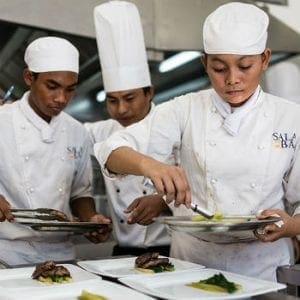 The hospitality industry is one of the largest industries in the world, and it can in many significant ways act as a catalyst for social change. As such a huge employer with so many different roles available at many different levels within the industry – including chefs, housekeepers, front of house, restaurants, events, finance, management, spa’s and facilities – it can create opportunities for the disadvantaged in societies across the developed and developing world.
The hospitality industry is one of the largest industries in the world, and it can in many significant ways act as a catalyst for social change. As such a huge employer with so many different roles available at many different levels within the industry – including chefs, housekeepers, front of house, restaurants, events, finance, management, spa’s and facilities – it can create opportunities for the disadvantaged in societies across the developed and developing world.
The disadvantaged come in many forms; poverty, lack of role models, lack of educational opportunity, mental or physical disabilities, addiction, homelessness or criminality. These are people who tend to be pushed to the margins of society, mostly ignored or reviled by the society they inhabit yet, with the right opportunity, they can make a significant contribution.
People with these disadvantages would not be on top of any hospitality recruiter’s list. Their profiles would make far from ideal candidates, yet with the right opportunities and support they can become valuable employees. The worldwide shortage of staff should be cause enough for the industry to review its recruitment practices and to now consider drawing on a much wider potential pool of employees. Ideal candidates, fully trained, enthusiastic and passionate are and will remain as scarce as ‘hens teeth’. But candidates with a potential to be well trained, enthusiastic and passionate are not. It does take a different mindset though to see the opportunity when facing the reality of the disadvantaged and marginalised.
It is somewhat of an indictment of our society that with notable exceptions, it tends to be charities, NGOs and social enterprises that invest in hospitality training for the disadvantage rather than government or mainstream industry.
Examples of not profit organisations that provide first-class hospitality training opportunities can be found in both the developed and the developing worlds. In Cambodia and wider Southeast Asia there are a number of hotel schools that provide high-quality professional vocational training in hospitality for the disadvantaged who may otherwise fall prey to human trafficking or remain in poverty. Notable examples in Cambodia include the Sala Bai Hotel School, and the Bayon Pastry School, with similar institutions found in Vietnam and Laos.
In the UK, the focus tends to be more on disability and disadvantage. Charitable organisations such as; the Foxes Academy in Minehead offers an inclusive hospitality training through their own hotel to those with learning difficulties, The Clink Charity offers fine dining kitchen and service training to prisoners through their public restaurants in prisons as well as an event catering, the Crumbs Project in Bournemouth provides hospitality related training to those with a range of disabilities , stabilised addictions and other disadvantage, through their cafes, restaurant, event and delivered meal services.
What these all have in common is a belief that through the opportunity of hospitality training, the disadvantaged can find inspiration and aspiration that takes them beyond the horizons of poverty, disability or addiction to opportunities for success, however they choose to define it.
What is needed now is for the mainstream hospitality industry to recognise that by supporting and working with such organisations, they have access to a wide range of different talents. Talents that with the right nurture and support can make loyal, enthusiastic and committed employees. The industry needs to wake up and ‘smell the coffee’, expertly made by some of those very people that they otherwise would reject.


















